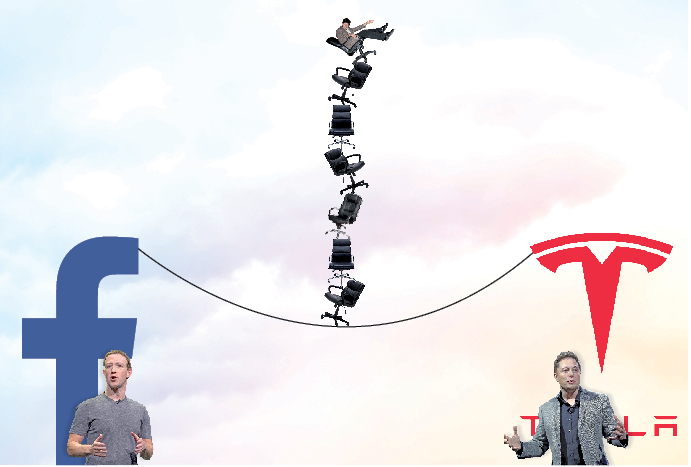

Nishant Arora -
The past few weeks have witnessed some bizarre and never-before-seen occurrences in the world of technology, and the credit, if you want to call it that, goes to Tesla and SpaceX CEO Elon Musk and Facebook Founder-CEO Mark Zuckerberg.
Both are super-famous — and blue-eyed boys of Silicon Valley. Stubborn and arrogant to an extent, the duo has proved newer ideas can take shape despite challenges, and have created brands that touch humanity at its very deepest level.
That they seem to be somewhat losing it and behaving in a manner that has caused unease among their workforce, customers, users and fans, is worrisome.
Let’s first talk about Musk, the man behind several successful ventures — PayPal, Tesla Motors, SpaceX and SolarCity, each of which has sent shock waves throughout businesses and industry. But tweeting irresponsibly almost every other day, smoking on a live show and abusing people (his ‘pedo’ remark for a diver) has made not only a dent in his image but his brands too.
In the book “Elon Musk: Tesla, SpaceX, and the Quest for a Fantastic Future” by veteran technology journalist Ashlee Vance, Musk says that he would “like to die thinking that humanity has a bright future”.
“Mass market electric cars have been my goal from the beginning of Tesla. I don’t want and I don’t think the vast majority of Tesla customers want us to do anything to jeopardise that objective,” the book says, quoting one of Musk’s e-mails.
Unfortunately, he has been doing things that do “jeopardise that objective”. The August 7 tweet about taking Tesla “private” that misled his investors, and then reversing gear after few days to stay public, did more harm than good.
SEC INVESTIGATION
Coming under pressure from his lawyers and investors of Tesla, the tech billionaire on September 29 agreed to step down as Tesla chairman for three years and paid a $20 million fine, in a deal with the US stock market regulatory authority, the Securities and Exchange Commission (SEC), to resolve securities fraud charges.
Tesla paid another $20 million to the SEC, despite not being charged with fraud. So a tweet worth $40 million!
Even after all this, Musk mocked the SEC within five days of the settlement, calling it the “Shortseller Enrichment Commission”.
A Twitter user who goes by the name Drew G wrote to Musk: “I don’t have much, but I believe in you and your vision. Unfortunately, I invest what little I have into @Tesla and I continuously lose months worth of savings due to your tweets. Please think of us small people.”
Amid his eccentric behaviour, the great Tesla cause — to provide people across the world a mass-level electric car that will help control pollution, save money and enrich the environment — has somewhat been lost.
Musk knows he can deliver on that. Despite a tumultuous career — saving his start-ups from the brink of bankruptcy several times — he is one of the most promising tech entrepreneurs today. The realisation has to come fast though.
PRIVACY ISSUE
On the other hand, Zuckerberg with his my-way-or-the-highway approach towards monetisation and making profit at any cost, has started hurting Facebook, both externally and internally.
The social media giant, that has become a medium for billions to connect, share and help one another via communities, is reeling under a plethora of data breaches (beginning with Cambridge Analytica) that has affected its user-growth, its reputation as well as revenue streams in the second quarter (April-June) this year.
According to online statistics portal Statista, Facebook added no daily active users in North America and Europe in the second quarter. It actually lost three million users in Europe.
Facebook also slipped to 9th spot in the world’s top 100 brands’ list by global brand consultancy Interbrand this week.
Internally, Zukerberg’s goal to monetise WhatsApp has forced the social media messaging service’s co-founders to leave the company.
One of them, Brian Acton, told Forbes that Zuckerberg was in a rush to make money from the messaging service and undermine elements of its encryption technology. “Targeted advertising is what makes me unhappy,” Acton said.
Four years after its acquisition by Facebook for $19 billion, WhatsApp, which now has over 1.5 billion users (against Facebook’s 2.3 billion), will reportedly carry targeted ads from 2019 — on a platform that has been ad-free till date.
Facebook got another jolt last month when Instagram founders Mike Krieger and Kevin Systrom quit the company, also reportedly due to disagreements with Zuckerberg.
Both Musk and Zuckerberg are bright, young entrepreneurs. Their goal should be — and remain — to ensure their platforms enrich people’s lives, especially in developing and under-developed countries. As their contemporaries — Apple’s Tim Cook, Microsoft’s Satya Nadella, Google’s Sundar Pichai and Amazon’s Jeff Bezos — plan for a tech-driven future without tantrums, the duo must also listen to what their customers and users want: A safe and sound ride, be it electric car or personal data. — IANS
Oman Observer is now on the WhatsApp channel. Click here



